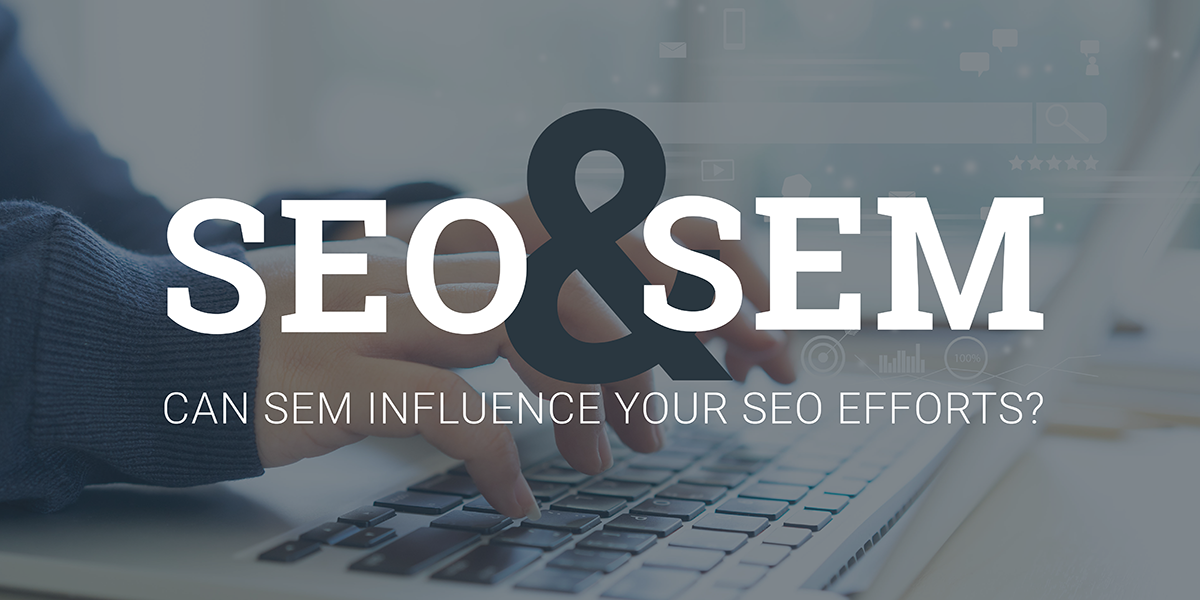SEO and SEM – Can SEM Influence Your SEO Efforts?
Lisa Hirst Carnes | January 2021

SEO and SEM are often conflated. There may be only one letter that distinguishes them from one another, but they are very different.
SEO stands for search engine optimization. In short, SEO is the process of using on-page and off-page efforts to gain visibility in the SERPs (search engine results pages) and in turn grow organic traffic to your website.
In contrast, SEM stands for Search Engine Marketing. SEM uses paid tactics to achieve visibility, drive traffic, and increase conversions.
SEO and SEM may be vastly different, but when they’re used in combination, they can create the special sauce you’re looking for.
One of the most perennial questions related to SEO and SEM is, “will advertising on Google give my SEO a boost?”
For years, there have been conspiracy theories floating the idea that if you spend money with Google on advertising, you’ll secure better organic positions for your keywords. Some marketers spout anecdotal evidence to support their claims.
While Google vehemently dismisses these theories, (Google Ads and Search have distinct objectives and they are seriously walled off from each other), SEM can indirectly and positively affect your SEO efforts.
Here are some of the ways SEM campaigns may boost your organic numbers.
Searchers who see one of your ads are likely to ignore your ad and click your organic listing.
It’s not uncommon for organizations to run branded campaigns. There are several reasons digital marketers run branded advertising campaigns. Bidding on your brand also gives you more real estate on the search results pages, leaving less space for your competitors. Plus, it’s easier to control the messaging in your ads.
Check out this example.
Our client, Hunger Solutions of MN, runs a branded campaign in Google Ads. Anecdotal evidence suggests that while searchers see the ad, they are more likely to click the organic search result.

One reason for this is that users have more control over the page they click versus clicking an SEM landing page. In this example, a user could click the “Staff & Board” page if they were interested in seeing who the executive director is.
That’s why if you’re running a paid campaign targeting branded keywords, you’ll likely see a bump in your organic traffic too.
If you’re new to SEM, a branded campaign is a good way to dip your toe in the water without a big budget. Branded keywords are typically inexpensive.
Searchers already exposed to your brand through paid advertising, are likely to search for your brand and return to your site.
In this scenario, a searcher sees your ad but doesn’t convert or even click. At a later time, they recall your brand name or keyword and find you organically. “Top of mind” visits will increase your organic traffic.
If the user goes on to convert organically, after initially clicking on your ad, that conversion will likely be marked as organic assisted by paid.
Paid advertising encourages engagement signals that influence SEO.
If a searcher clicks on your ad then proceeds to share your website on social media, that mention can help your SEO. Similarly, if that searcher links to your site, that can also positively impact your SEO.
Shares and links influence SEO.
Paid advertising extends your reach and may boost social signals like shares and links that influence SEO. Social media helps uncover content marketing and link building opportunities that will boost your organic rankings.
Investing in SEM, will not only increase your website traffic, but it can also positively impact your SEO efforts. The bottom line is that SEO and SEM help each other.
Curious to learn how SEM and SEO can help your organization reach your goals? Contact us today!

